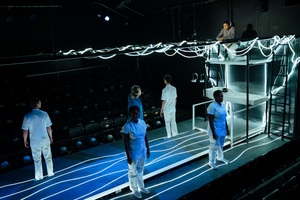Review: FRANKENSTEIN, Southwark Playhouse

![]()
The National Youth Theatre revamp Mary Shelley's masterpiece and update it for a modern audience in what should be a cutting-edge production at Southwark Playhouse. Carl Miller's rewriting of the first ever science fiction novel looks more like a translation for the 21st century rather than a faithful adaptation, setting the story in a nondescript future that doesn't look too far away. Director Emily Gray leads the stylish retelling: Garth (Sonny Poon Tip) corresponds with his sister Bob (Natalie Dunne) via radio, who details the rescue of Doctor Victoria Frankestein (Ella Dacres) in the Arctic and the obsession that's led her to that point.
What follows is a relatively prosaic transposition. Miller and Gray explore the ethics of creation and human responsibility through the relationship with technology and the inherent distance it creates. Here, Frankenstein doesn't impart life to a non-living collection of body parts, but builds a gynoid and attempts to give it empathy by programming it to have emotional responses. By rule, she is repulsed and her invention escapes.
Garth controls the narrative with a remote, moving the action through time and locations in a conference of sorts where the public are fellow experts in robotics. This set-up grants the show a riveting pace that's bolstered by the 16-strong company who move as one, but that's not fully exploited. While the core storyline is unmistakably human nature, the play heavily relies on pushing forward the perils of technological dependence quite messily, failing to create a clear trajectory.
The presence of a brief acknowledgement of refugees, a homosexual love story, and the recurring reiterations of the transcendence of virtual reality slightly impact the confidence of the material instead of adding new elements. The use of VR headsets in the second act comes as a surprise and looks like a weird flex more than anything else. It's exceptionally cool and the innovation used is truly impressive, but it's also not entirely indispensable for the outcome of the project.
The philosophical slant of the drama is present but thickly veiled, and the visuals appear at the expense of it. The cast are, however, extraordinary. Sarah Lusack is Shell, the machine: mortal enough in her performance yet with a lightly cold and stiff semblance, she glides on Hannah Wolfe's thin traverse stage as her character explores the rules (or lack thereof) of society. As her creator, Dacres' determination is torn apart bit by bit by the events, leading to the internal annihilation of her beliefs.
The supporting cast relentlessly reinforces the main actors, with exciting and remarkable contributions from Jamie Foulkes as Eli, Victoria's adopted brother and husband, and Guy Clark as Wollstonecraft the policeman. Gray orchestrates the company with precision but faint purpose, ultimately highlighting the devastation of earth by lack of care but failing to make any substantial points besides the (debatable) negative impact of technology.
Just like the original monster, this reimagined Frankenstein presents features that are only appealing when considered separately.
Frankenstein runs at Southwark Playhouse in rep with Great Expectations until 30 November.
Production photo by Helen Murray
Reader Reviews

Videos

